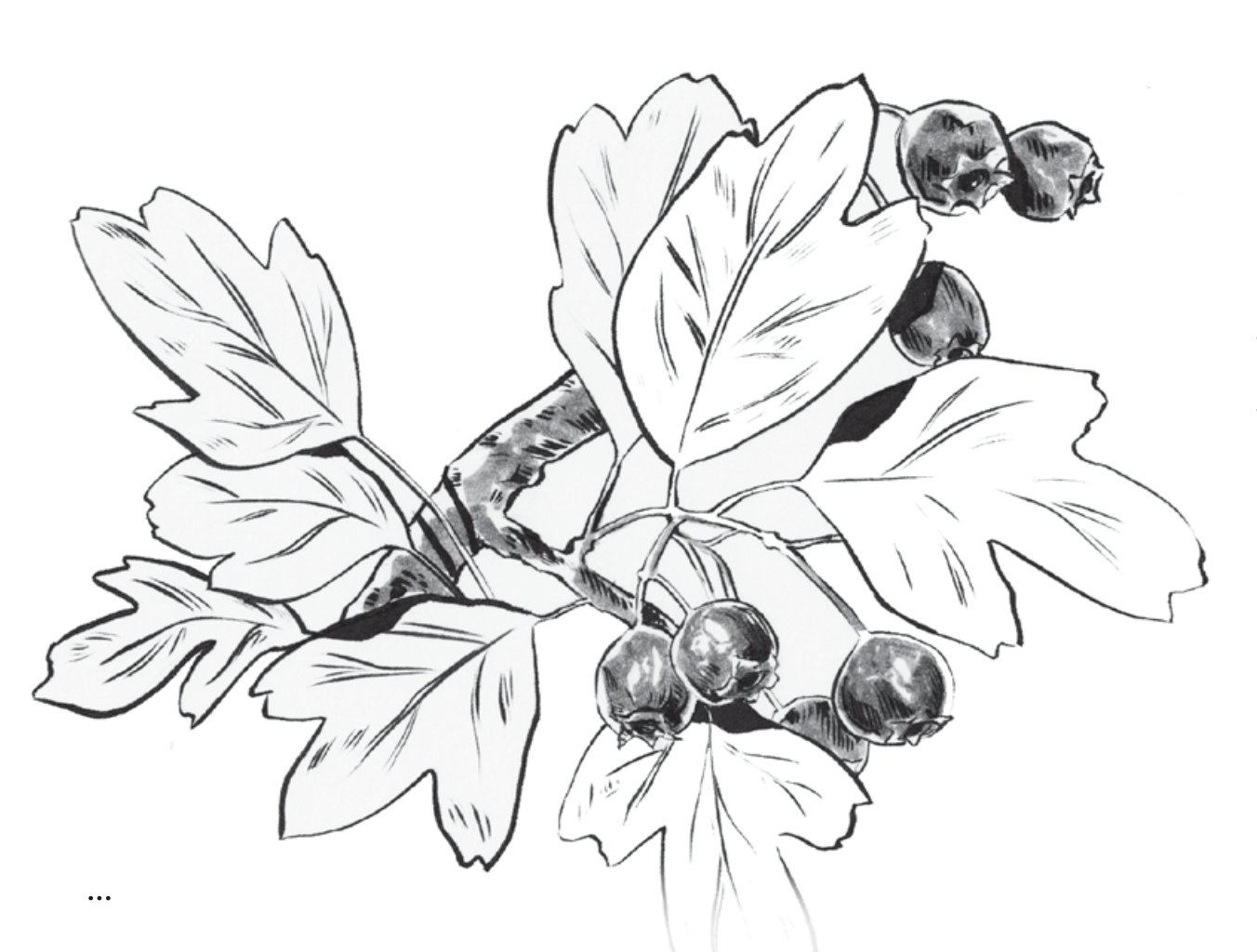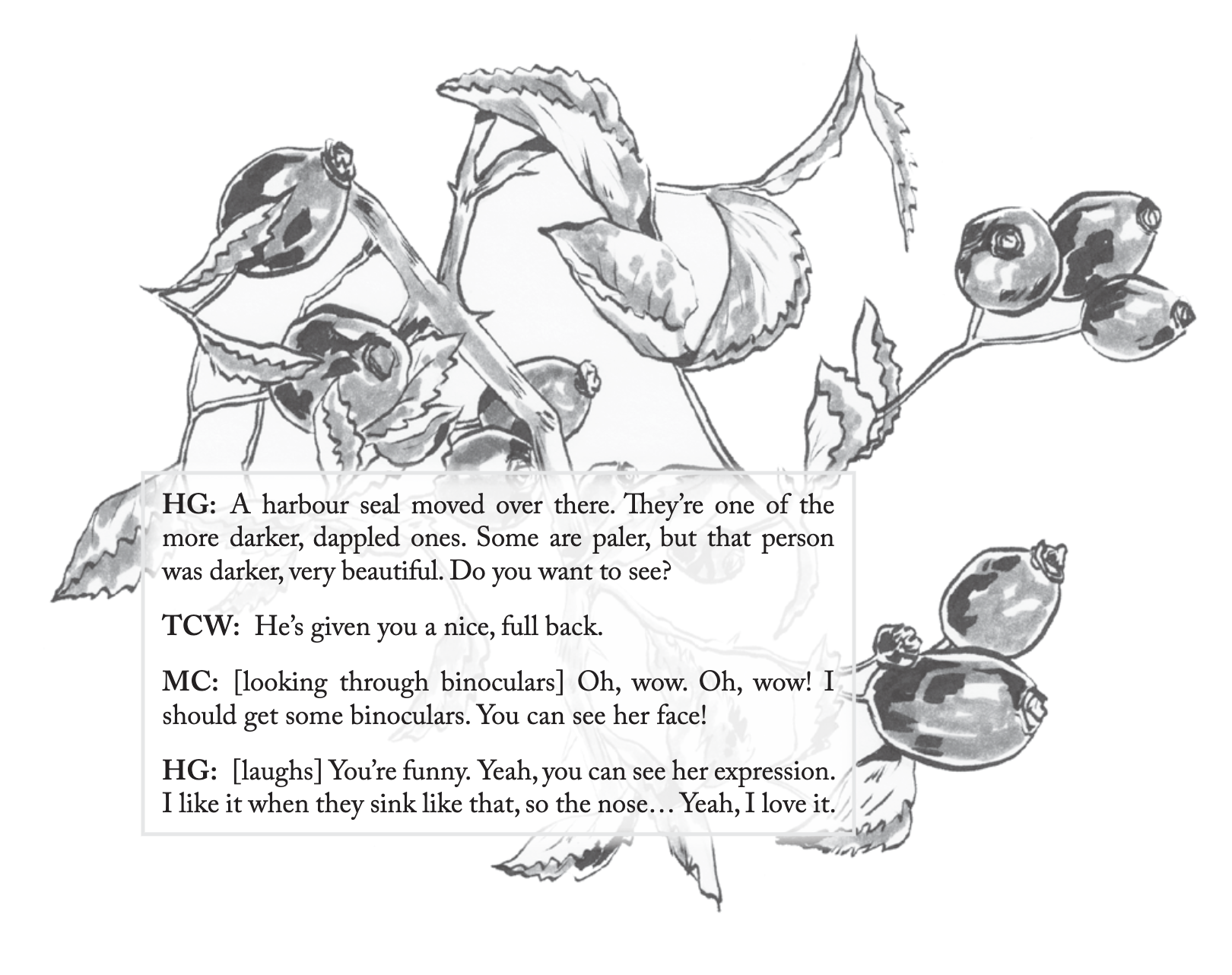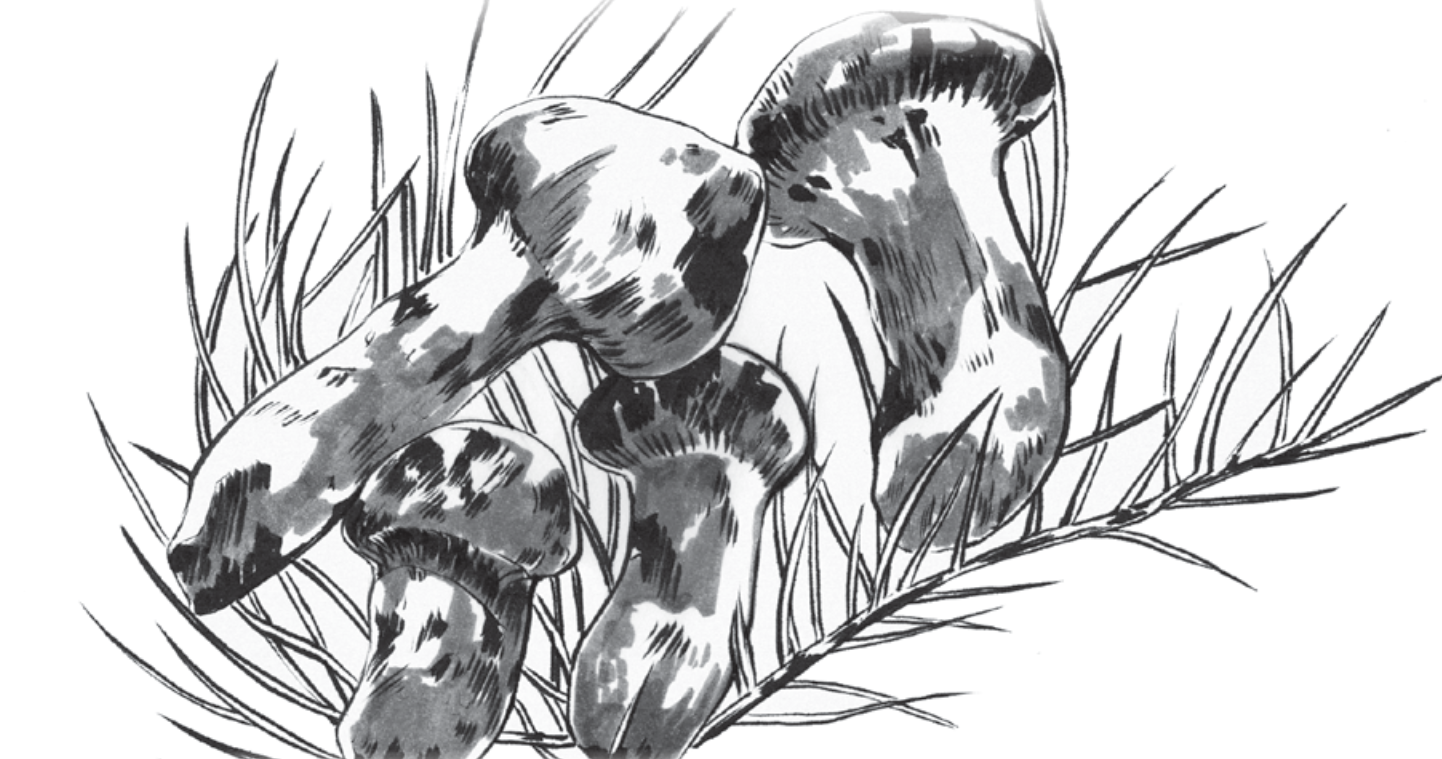In October 2018, I walked with T ’uy’t’tanat-Cease Wyss and Hiromi Goto through Maplewood Flats (North Vancouver, BC), discussing the plants and beings we encountered and Cease’s and Hiromi’s relationships with the land. The following are excerpts from that conversation.
— MC
T’uy’t’tanat-Cease Wyss
Chen kwenmantumi-wit [Welcome to this place]
Huy chexwa’ [Thank you]
Wey chexw yulh [(You’re welcome) here]
En ha7lh skwalawens [My heart feels lifted]
En ha7lh skwayel [It’s a great day]
T’uy’t’tanat kwi en snas [T’uy’t’tanat is my ancestral name]
I can’t give you the name of this place, but that’s one of the things that Maplewood Flats and Tsleil-Waututh Nation are working on . . . I am Skwxwú7mesh and Sto:lo. That’s my Coast Salish ancestry, neighbours to Tsleil-Waututh, very closely related to much of the nation. I was saying, “Welcome to this space, and my heart feels lifted. It’s a beautiful day. My traditional name, my ancestral name is T’uy’t’tanat.”
Hiromi Goto
I’m honoured to be here with you, Cease.
Mary Chen
Yes, thank you both so much for taking this walk with me today.
TCW
Oh, likewise. This is like, “Wow, they want to spend some time in the forest with me.” I avidly follow all your [Hiromi’s] posts on Instagram. I love all the beautiful photos you take and comments you make. So I was like, “This will be fun.”

TCW
I’ll show you some berries that are growing here. So, rosehips and hawthorn berries are two medicines I use a lot side-by-side. So, for your blood pressure, the rose hips, and for your heart is the hawthorn. So, together, they work on regulating everything. Picking hawthorns is very easy. You just dry them, make them into tea. But with the rose hips, you can see that there’s this fuzzy coating around them, right? See that, it’s kind of shiny? When digested, it itches everything. The worst part is . . .
HG
Your bum?
TCW
Yeah, when you go to poop.
HG
It itches your bum? [laughs]
TCW
Yup. That’s why they call it “itchy bum.” I did an herbarium project with kids last year with the CAG [Contemporary Art Gallery] and ArtStarts. I taught the kids this, and one of the kids did rosehips on his herbarium, and the last statement he made was, “Caution, will cause itchy bum.” Everybody was like, “Oh my God, that’s so adorable.” [laughs] It’s like, “Yeah, I know it’s adorable, unless you have it!” Anyway, I’m gonna leave these here. See if any birds come by and want to grab them.

MC
I want to ask you about your experiences with nature and learning about it, Hiromi-san. Where did you learn so much of what you know?
HG
I grew up…my parents were mushroom farmers. The farming is 365 days of the year. There’s no holiday, no Christmas. You just keep on picking. [laughs] But we lived then near the border between Canada and the US, in the countryside, in beautiful, beautiful deciduous mixed forest and some farmlands. So, when I didn’t have to work at the farm, I was in the forest and playing by the pond and that was my preferred space. And it was just more observation — being in these spaces, observing, loving those spaces. But I think those spaces loved me. Because it was solace. Yeah, I think those spaces were loving me, and throughout my life, it’s been very important, this relationship.
I’ve also learned from books and from listening to speakers who have knowledge they share. I don’t know at which point I understood that salmonberries are edible, for instance. Someone, maybe a childhood friend, must have told me . . . I’ve never had a very good memory and sometimes I’ve wondered if writing stories has been a kind of compensation for the memories that didn’t stick . . . I guess something there spoke to me, and also, you know, very much part of that whole TV culture in the ’70s, watching every nature show on TV I could watch, and the whole Jacques Cousteau. [laughs]
TCW
I was all over that.
HG
Remember Jacques Cousteau? Oh my God.
TCW
I know!
HG
And those Canada’s Hinterland Who’s Who? Those little vignettes they would have.
TCW
“We’re in the Hinterland now.” I’m like, “What’s the Hinterland? I can’t wait to meet the Hinterland.”
HG
I know, and I look at it now, and it’s just like, oh my God, it’s just so colonial.
TCW
And so cheesy, right? It’s like why did we love that? [laughs]
HG
Yeah. Now, I’m trying to, as far as I can, decolonize my relationship to my idea of land or what is called “wild,” which is a weird word — a colonial word, I think. So, trying to understand that the language of things shapes our understanding of things. So, it’s a complicated process of unlearning and trying to learn a different way of being, which also means learning a different kind of language, which is obviously important to me because I’m a writer . . . So, I’m trying to move through this kind of learning right now. I think there’s also a very white heteropatriarchal notion of who’s a naturalist or who’s doing “nature writing.” What does that person look like? I think it’s really important for people like me, who are settlers and not white, to really examine and think about and try to understand what our relationship to place here and history and relations . . . what it all might mean.
MC
Yeah, that really resonates with me because I think about that a lot as well. How can I, as a person, who is a settler person of colour here, hold a responsible relationship to this land? I’m here, so what can I be doing to be responsible?
HG
Yeah, yeah.
[When] I go to schools, I’ll often really try to look for the kid in the class that is not interested at all, and I will make that kid interested because once they’re interested, the rest of the kids have heard the same message, too, right? That’s the thing I’m most determined to do — create a better connection so people become stewards of the land and the natural worlds . . .
— T’uy’t’tanat-Cease Wyss
HG
My children didn’t feel affinity or the call to “wild” spaces. They’re very urban, and I guess part of me mourns that because I took them on those walks. You know, feed them salmonberry and identify different kinds of berries you can eat and where to find frogs and all those walks we went on.
TCW
I went through that a bit with my daughter. I worried, actually, for years because she wasn’t interested. Then it became important to her one day, and then she really dove into it. Now, I’m watching Senaqwila give that knowledge to [her daughter] Kamaya, and I give it to Kamaya, too.
HG
Mine didn’t really take to it —
TCW
— But it’s in them. It’s in their DNA.
HG
It is. It is, yeah. They experienced it.
TCW
Maybe if and when they decide to have children themselves, or have children in their lives in some way —
HG
Yeah, it might return.
TCW
— that’s when it will come around.
HG
Yeah, yeah, kind of like how mycelium will lie dormant underground for a very long time — years and years — and all of a sudden . . . Maybe that’ll happen, yeah.

TCW
I think everybody should have access to food, always. But I get concerned about foragers that just take a whole bunch and don’t think about what they’re leaving. It’s like [sighs] “Okay, thanks for the beautiful pictures. They’re great, but what did the areas look like that you foraged from? Were there any left for animals, for other people? Did you ask permission from the Indigenous people from that area?” Those are the things I want to know.
I spoke at a conference in Olympia last year, and that was the first thing I asked. I asked a room with over 100 people in it. I said, “How many of you consider yourselves to be ethical gatherers?” Everybody put their hands up. I said, “Okay, how many of you seek out Indigenous people and ask their permission to be in their territories?” There were only four or five hands left, and all these heads were down.
I’m like, “I’m not shaming and blaming. I’m asking you to think about your ethics. What is ethical to you? What’s ethical to you isn’t ethical to me or all these other people that actually do have really good ethics. So, it’d be like thinking about your own personal yard and how many people are you gonna let in your yard to take things? Because to Tsleil-Waututh and Musqueam and Skwxwú7mesh, this is our yard.”
So, for us, we’re kind and loving people that want to share. Food is everything, but when everything is taken from us and we have a small amount, where do we fit into that element of what foraging is? Most Indigenous people won’t call themselves “foragers.” It’s a settler term. Ours is, you know, we’re “gathering.” We’re gathering. We’re always gathering, and we only take what we need for us and our family. Even me, as somebody with a company that makes teas and sells herbal products, I’m so sparse of what I take off the land, and I try to make tinctures and salves so that I don’t have to take a lot of something. But my whole life has been about wild crafting and gathering, gleaning. I’ve never thought of myself as a forager . . . It’s a new word to me.
It’s very frustrating that people don’t see their part in that, and they don’t understand that they have to do better, you know? We have to do better. As an Indigenous person, I can say that. I have to do better, and I know my people all think that. We all know we have to do better. So, why are the settlers not doing better? It’s not settlers of colour I’m worried about. I am more worried about the Euro settlers because they have this narcissist element, saying, “Well, we’ve never had to apologize for what we take. We just take it. It’s ours.” Because I often see, especially in this area of the world, it’s been mostly the Indigenous people, Asian people from several countries, Hawai‘ians, different Black people from different places, and Latin-American people, we’ve all been the ones that have to apologize to the white settler for how we’re trying to live.
HG
I have sort of, I think, a cultural relationship to gathering foods — part of my desire to gather wild foods is to mark the season. Traditional Japanese relationship to food is highly attuned to the seasons. So, with the autumn, it’s mushrooms.
I’ve been looking off and on for a pine mushroom, matsutake, over the years living in Canada. It was only last year that I stopped at the Lillooet First Nation Band Office and took a bundle of tea and formally requested permission to look for mushrooms — for chanterelles and matsutake — on Lillooet territories. Long overdue, and I hadn’t really thought about it, obviously, until I read the summary of the Truth and Reconciliation Commission. I didn’t think about my responsibilities and my relations with land to the degree that was necessary, I think, until I read that. I know there’s a lot of problems with how that whole thing played out and how “reconciliation,” the word, is being used by different groups in different kinds of ways. I think there were important things for me to learn from that summary, and I appreciate that and respect the work that many people did to try to educate more of us settlers. So, it was important for me to learn these things, continue learning the huge gaps in my knowledge and understanding and to learn more about what my responsibilities are. But trying to be more mindful of how I gather, and, again, I gather for the family table to mark the season. It’s not, again, for wealth. [laughs]
TCW
Yeah, I know.
HG
Yeah, it’s almost a ritual. Since the last few years, too, I’ve been placing tobacco leaf when I gather food from these places. I’ve been thinking about how or why I do that, and I think it’s trying to be respectful of traditions and relations that are here already, that I come to as a newcomer. I think about appropriation as well, too, and I don’t want to be a new age flake, you know? There’s that whole thing, like, “Oh, yeah, I love sage.”
TCW
“Yeah, it’s so great. I don’t know why, but it’s so great.”
HG
[laughs] No, it’s embarrassing.
TCW
It’s so true though! There are people like that!
HG
They’re selling sweetgrass in the mall! I’m just like, “Whoa.” [For me,] it’s, on the one hand, trying to learn. On the other hand, trying to be respectful. But I think of it as . . . I’m the foreigner here, and there’s all these sacred rituals and relations that I don’t fully understand. They’re not from my own personal cultural belief systems, but I think about if I go to another country as a visitor and I’m taken to a sacred space, I’m respectful. So, that’s what I think about when I’m placing tobacco, when I gather food here now, to try to sort of be respectful of sacred engagements with place, and respectful without being a taker. Also, when I do that, it holds in check . . . It reconfigures that moment as a meaningful action, rather than, “Oh, look at how much I scored today.” It changes that up because it’s like, oh, this is not about profits or gaining . . . Of course, there’s excitement if you find a mushroom that you’re looking for, and you’re like, “Ah, so excited!”
TCW
It’s so exciting.
HG
You’re just like, “Wow.” It’s amazing. But then placing the tobacco down, I feel it calms me, and it becomes solemn. So, I think it’s important.
TCW
It’s nice to hear that because I think people need to hear that story, what you just shared, and understand that it doesn’t take a lot to do that . . . I just think if people are wanting to forage or whatever they want to call it, just do it with a good heart and always think. That’s why I think your story is so important, because you went through a natural process of coming to that realization of what the process was. You didn’t go ask somebody to take you there. You just went there and said, “I want to do this the right way. I want to ask these people if I can be here.” You didn’t make excuses so that you wouldn’t do it. You just did it.
HG
I did make excuses in my head.
TCW
Until you got there.
HG
Yes. Yes.

